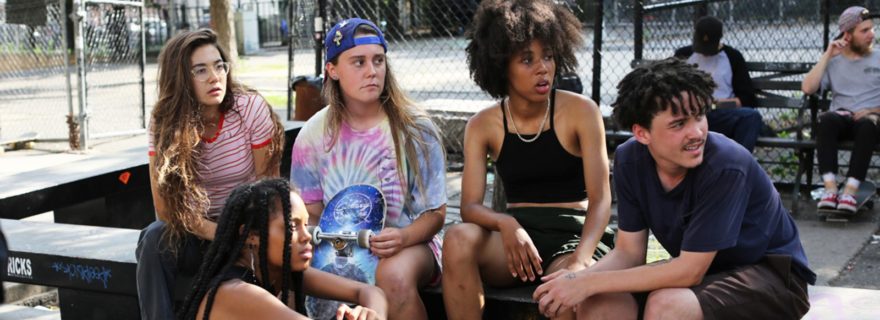Skate Kitchen
Movie Rating:
3
Being a teenager isn’t easy. Though every kid has a different pile of crud to deal with, they tend to have more in common than not. They all want to find where they belong. They want to figure out how to navigate their world on their terms. And they want to have fun before any major, oppressive, adult responsibilities kick in. On that level, the universality of teenagers is the binding that holds Skate Kitchen together. However, the film really shines when it highlights the differences between these characters and your regular, average teen.
Known primarily for her intriguing documentary The Wolfpack, director Crystal Moselle took a similar real-life approach to casting. Skate Kitchen is about a group of skateboarders, all played by relatively unknown but skilled skaters. This results in some natural, though superficial performances. The emotions feel authentic, when they can be sussed out from behind the actors’ reserved faces.
Skate Kitchen follows Camille (Rachelle Vinberg), a kid on Long Island who only wants to skate. She butts heads with her mother, who wants her to stay safe and healthy. After meeting up IRL with a group of other girl skaters she followed on Instagram, Camille suddenly feels like a part of a cool gang; no longer the lone female outsider. Soon after finding her tribe in these girls, Camille runs away from home and tries to make a life skating in New York City.
Predictably, she hits some bumps in the road, mostly usual teenage stuff. Boys bring them together and tear them apart. There’s some jealousy and infighting, nothing out of the ordinary. This unremarkable part of the teenage experience takes up the bulk of the film. The comfort these girls have with one another is reassuring and serves as a reminder to those of us who have reached “Get off my lawn” age that being a kid can be pretty great, though these scenes can be a bit of a slog to get through.
Where Skate Kitchen works best is when it highlights the female teenage experience with fluent subtlety. At no point in the movie do these girls sit down and discuss how hard it is being a girl, or how marginalized they feel at the skate park. They’re a big group of confident girls, and they’re not intimidated by the haters. However, you do see subtle interactions happen in passing that remind the audience that the characters do have to constantly prove themselves more than their male counterparts. The best of these interactions is when, just walking down the street, a random boy sees Kurt (Nina Moran) carrying a skateboard and asks her if she can ollie. She responds casually and sarcastically, and it’s certain that she’s had to deal with this gatekeeping sexism her entire life. But they keep moving. The point of this scene is not that jerks will question them. The point is that they don’t let these jerks stop them from skating. For any women in the audience who deal with this nonstop onslaught of daily sexism (myself included), this is a powerful but quickly passing moment in Skate Kitchen.
Such social commentary is woven into the fabric of the film without calling attention to itself. Just like the skater girls, Skate Kitchen might not claim to be revolutionary, when it is in fact making an awful lot of bold statements about sexuality, race, and gender norms. Though this should be celebrated, it’s hard to escape the fact that Skate Kitchen drags for a good amount of its running time and fails to present any meaningful performances from its cast.



